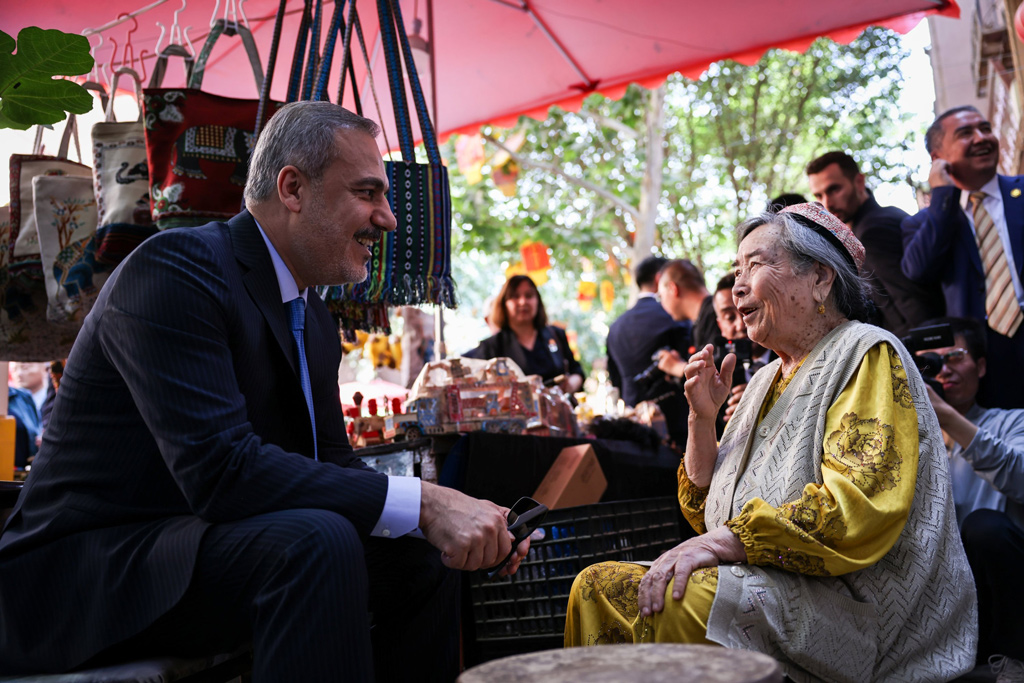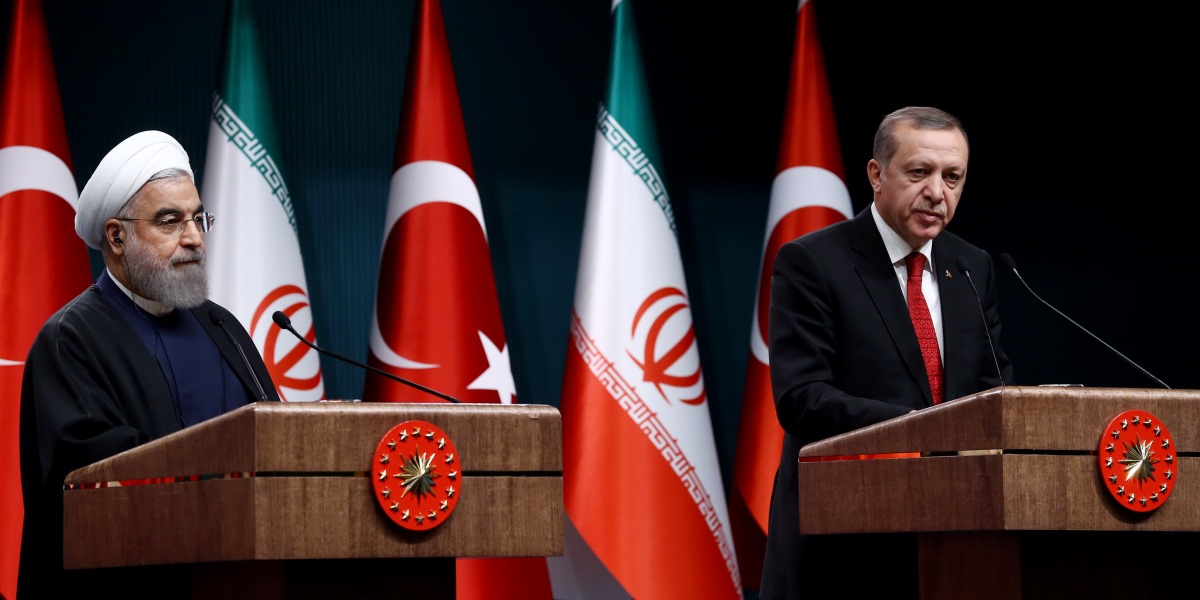The recent visit of Turkish Foreign Minister Hakan Fidan to China marks a significant milestone in the evolution of Turkish foreign policy within the shifting strategic landscape of Eurasia. As Türkiye aims to balance its strategic partnerships and expand its influence, this visit underscores crucial discussions and potential impacts on foreign policy.
During his visit, Fidan engaged in extensive talks with his Chinese counterparts, focusing on several pivotal issues. A key aspect of the bilateral relationship between Türkiye and China is their pragmatic foreign policy orientation. Türkiye has consistently adhered to the one-China principle and emphasized the importance of China’s territorial integrity. Similarly, China has approached its diplomatic and economic relations with Ankara from a very pragmatic perspective. Fidan’s visit has strongly highlighted this pragmatic approach in Türkiye’s relations with China.
Logic behind Türkiye’s approach
Türkiye’s engagement with China is part of a broader strategic vision, often referred to as Türkiye’s “Asia Anew” initiative. This policy shift is driven by several key factors. First, it reflects Türkiye’s ambition for a geostrategic reorientation in global politics. As global power dynamics shift toward Asia, Türkiye aims to position itself as a strategic player in this emerging landscape. Strengthening ties with China is a natural extension of this reorientation, allowing Türkiye to leverage its unique geographic position. This new policy orientation also signifies Türkiye’s quest for autonomy in international politics, marking a new trend in its relations with Western allies. It is evident that Türkiye perceives the rise of Asia as a crucial factor in recalibrating its foreign policy and geopolitical strategy.
The second driving factor behind Türkiye’s vision toward China is its policy of economic diversification, which underpins its trading state foreign policy approach. Faced with economic volatility and the need for sustainable growth, Türkiye is seeking to diversify its economic partnerships. Engaging with China, one of the world’s largest economies, offers significant opportunities for trade, investment and technological collaboration.
The third driving factor is Türkiye’s aim to enhance its regional influence. Türkiye’s proactive engagement with China is a strategic move to increase its influence in Central Asia and the Middle East. By aligning with China’s Belt and Road Initiative (BRI), Türkiye can play a crucial role in regional connectivity and economic development, thereby bolstering its geopolitical stature. Additionally, Türkiye’s diplomatic balancing act, a cornerstone of its recent foreign policy, shapes its vision toward China and the Asia-Pacific region. In an increasingly multipolar world, Türkiye’s foreign policy seeks to balance its traditional Western alliances with new partnerships in Asia. This approach enables Türkiye to navigate complex international relations while pursuing its national interests and regional strategies.
Multiple agenda, implications
During Fidan’s three-day visit, several key strategic issues were raised. The foremost objective was to increase bilateral trade and economic cooperation between the two countries. Both sides emphasized the importance of enhancing economic ties, with discussions centering around increasing trade volume, reducing trade barriers and exploring joint investment opportunities, particularly in the infrastructure and technology sectors. However, in recent years, there has been a slowdown in joint investment projects. Türkiye’s main objective is to address this slowdown, expedite these projects, and identify the obstacles causing delays. Ankara is also focused on reducing the trade imbalance, which currently favors China, by urging China to import more Turkish products and increase Chinese investment in Türkiye.
Regional security issues were another important topic discussed during the visit. Given the current global tensions and regional conflicts, security cooperation was crucial for both countries. The dialogue included strategies to combat terrorism, address regional security threats and enhance military cooperation. Specifically, Israel’s war in Gaza and the Russia-Ukraine conflict were key points of discussion. While both Türkiye and China support a two-state solution for the Palestinian issue, Türkiye’s stance toward Israel is more radical compared to China’s.
The BRI holds strategic benefits for both countries. While China views the BRI as a means to enhance its global geo-economic leverage in its competition with the U.S., Türkiye sees the project as an opportunity for economic gain and a way to recalibrate its geopolitical position in global rivalries. Türkiye’s strategic location as a bridge between Europe and Asia makes it a key player in China’s BRI. Fidan and Chinese officials explored ways to further integrate Türkiye into the BRI, aiming to boost connectivity and economic development.
One of the critical topics during the visit was Türkiye’s interest in becoming a member of BRICS, an organization that has been playing an increasingly important role in global politics. As the international system transitions toward a multipolar world, BRICS provides an alternative worldview for countries seeking balanced relations beyond Western alliances. Türkiye’s interest in BRICS symbolizes a significant shift in its traditional foreign policy. During the visit, Fidan stated that BRICS could offer Türkiye a “good alternative” to the European Union for boosting its economic prospects. He noted that while Türkiye remains in a customs union with the EU, it is also exploring new opportunities for cooperation with various partners on platforms such as BRICS. Membership in BRICS would potentially introduce new dimensions and debates into Turkish foreign policy.
Even though Türkiye maintains a pragmatic approach in its relations with China, there are also divergences over the Uyghur issue. During his visit, Fidan urged Chinese authorities to protect the cultural rights of minority Muslim Uyghurs and allow them to “live their values.” Türkiye uses very careful language when addressing the situation in Xinjiang province, considering both the domestic political dynamics and the need to maintain a balanced approach toward China. This caution may explain why Fidan posted an emotional tweet on his X social media account regarding his visit to Urumqi and Kashgar in the Xinjiang Uyghur Autonomous Region in Western China.
Challenges
While the visit presents numerous opportunities, it also poses significant challenges that Türkiye must navigate carefully. Maintaining a delicate balance between Western alliances and growing ties with China requires nuanced diplomacy. Türkiye’s relationship with NATO and the EU could be strained by closer ties with China, as Western allies might perceive this engagement as a pivot away from traditional partnerships, potentially leading to diplomatic friction. Therefore, Türkiye must clearly articulate its foreign policy strategy to reassure its Western partners that its engagement with China is aimed at economic diversification and regional stability, not at the expense of its existing alliances.
Increasing economic ties with China could also lead to dependencies that might limit Türkiye’s economic autonomy. Over-reliance on Chinese investments and trade could expose Türkiye to economic coercion, where political disagreements might lead to economic repercussions. To mitigate this risk, Türkiye needs to ensure that its economic relationship with China is balanced and that it continues to cultivate diverse trade and investment sources. Strengthening economic resilience by diversifying its economic partners will be crucial for maintaining Türkiye’s economic sovereignty.
Engaging with China may also provoke concerns among Türkiye’s traditional allies, particularly in the West. The U.S. and EU might view Türkiye’s closer ties with China with suspicion, given the broader context of U.S.-China and EU-China rivalries. This could result in pressure on Türkiye to align more closely with Western policies, potentially creating diplomatic tension. To navigate these rivalries, Türkiye must maintain open communication with all parties involved, ensuring that its foreign policy decisions are understood and respected.
Another challenge involves technological and security concerns. Collaboration with China in areas like technology and infrastructure could raise security issues, given China’s different tech-political approach compared to other countries. To address this, Türkiye must establish robust regulatory frameworks to safeguard its national interests while benefiting from Chinese technological advancements.
Fidan’s visit to China has significant geopolitical and foreign policy implications. Türkiye’s engagement with China reflects its strategic balancing act in global politics. As a NATO member and a candidate for EU membership, Türkiye’s close ties with China demonstrate its multifaceted foreign policy approach. Strengthening economic relations with China is a strategic move to diversify Türkiye’s trade partners, aiming to reduce dependency on traditional Western markets and mitigate economic risks. Additionally, by deepening ties with China, Türkiye can potentially enhance its influence in Central Asia and the Middle East. Cooperation under the BRI framework could bolster Türkiye’s role as a regional powerbroker.








